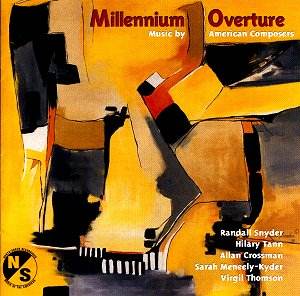Snyder’s Fictions,
completed in 1999 and scored for chamber
ensemble (woodwind quartet, trumpet,
horn, percussion and string trio), is
a concerto for ensemble in all but name.
Its twenty-five short sections, of which
the opening one Veiled recurs
later as a ritornello, display
a wide variety of moods in a colourful
kaleidoscopic manner. A brilliant, often
virtuosic showcase for ensemble.
British-born Hilary
Tann composed her piano trio Nothing
Forgotten for the Adirondack
Ensemble who gave the first performance
in 1997. Inspired by a long poem by
Jordan Smith, its three movements (Andante
maestoso – Allegretto – Andante recitativo)
playing without a break bear a superscription
(or subtitle) also taken from Smith’s
poem and quote from two traditional
Adirondack songs. This is another attractive
work by a composer who is still shamefully
under-represented in the current catalogue.
I hope that the present recording of
this beautiful, lyrical work will soon
prompt new recordings of her music.
One of the most attractive and endearing
works in this release, as far as I am
concerned.
millennium Overture
Dance by Allan Crossman, scored
for flute, clarinet, violin, viola and
cello, sets out as a jolly celebratory
piece with a pensive middle section
"reflecting on the darker events
at the turn of the new century".
It nevertheless ends in high spirits.
Sarah Meneely-Kyder,
as well as Allan Crossman, is a name
new to me. Her Letter from Italy,
1944 – for baritone and string
quartet – was written at the request
of Chai-lun Yueh. It sets a poem written
by the composer’s sister, itself based
on excerpts from diaries and letters
written by their father during his years
of service as an Army doctor during
World War II. This often gripping and
moving work is the more poignant for
its chamber setting infusing it with
sorrowful, sometimes bittersweet intimacy.
The final work in this
worthwhile release is a real rarity
by the veteran composer Virgil Thomson.
His Sonata da Chiesa,
completed in 1926 and scored for rather
unusual instrumental forces (viola,
clarinet, trumpet, horn and trombone)
is one of his earliest acknowledged
pieces. It is in three movements: Chorale,
Tango and Fugue. The first movement
already displays Thomson’s liking of
old, simple hymn tunes (think of his
Symphony on a Hymn Tune
composed two years later), whereas Tango
– no doubt – partake to the spirit of
Les Six. The concluding fugue
is a brilliant piece of formal mastery.
At times, the music may be redolent
of the harmonic and rhythmic world of
Stravinsky; but it is quite effective
in its handling of an avowedly disparate
instrumental setting. A most welcome
rarity by all counts and one that will
take many Thomson fans by surprise.
This is yet another
typical North/South release bringing
together worthwhile, mostly unfamiliar
music in excellent, carefully prepared
and committed performances. Well worth
having.
Hubert Culot
